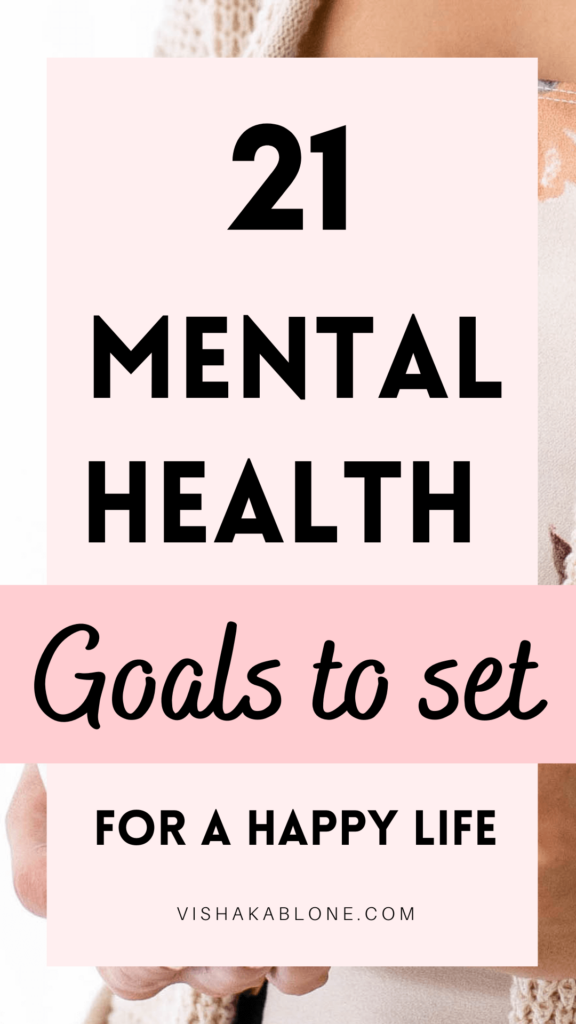On our road to success and happiness, we tend to set all kinds of goals but mental health goals.
But I’m happy that now more and more people are becoming aware and responsible for taking care of their mental health and are looking for ways to improve their mental health.
To help you with it, in this post, I have listed out 20 mental health goals you can set for living a simple and happy life.
I live by them and I truly believe that better mental health is really the bedrock of all that we do.
All the success and material accomplishment in the world wouldn’t mean anything if on the inside we were having a breakdown and if our mental health was in shambles.
So I hope today’s post inspires you to set your mental health goals along with your other life goals.
What are mental health goals?
Table of Contents
Mental health goals are goals that you set for taking care of your mental health and well-being. They are the goals that help you in protecting your inner peace and in helping you keep harmony with everything else that you do.
Mental health goals are those goals that help you keep your life sane, simple and so that you can live a much more joyful, happier and satisfying life.
Why set mental health goals?
When setting goals, we set personal goals, life goals, health goals, and financial goals, but miss setting mental health goals which is actually the foundation for all other goals in our life.
Then we wonder why we can’t focus on our main goals with happiness, joy and determination.
In my life, I have found that when I keep my mental health and well-being a priority first, then all other aspects of my life go smoothly and I am better at achieving and working on my other personal goals.
I have found that mental health goals are the first goals that we need to set and focus on and then only we must work on our other life goals.
Without better mental health, I truly feel that our other goals wouldn’t be able to be accomplished, and even if they did, we wouldn’t be truly happy in the true sense of the word.
Here is why we all need to set mental health goals:
- To live joyfully and meaningfully
- To let go of everything that is obstructing you towards a purposeful life
- To improve our self-esteem
- To gain courage and confidence to reach all other goals
- To have success as well as happiness in life
- To come back to the centre of your life
- To be enthusiastic in achieving all other goals
How to Set Mental Health Goals
1. Know what you’re struggling with
The first step in setting mental health goals is to identify what you’re struggling with most.
It is often the things that we’re struggling with most that show us the path where we need to bring light, and kindness, and where we need to set firmer boundaries or let go of a little bit more.
For example, if you’re currently struggling with frustration with yourself, identify where that frustration is mostly coming up from.
Most of the time it is our inability to give time to ourselves and the habit of keeping everyone else’s needs above our own.
Or it may be a result of accepting too many responsibilities and commitments because of your inability to say no.
In that case, your mental health goal would be to set firmer boundaries and to have the courage to say no from now onwards.
This way, know what you’re struggling with and try to identify its causes. That is the first step to setting your mental health goals
2. Set short-term mental health goals
On the basis of your struggles, set 1-3 short-term mental health goals for yourself.
Short-term mental health goals are those goals which you can set ahead straight away. They are mostly specific and measurable and something that can be ticked off on a day-to-day basis.
Some examples of short-term goals would be
-Get out of bed by 6 am
-Write a daily gratitude journal for 5 minutes
-Pray every day
-Stick to a daily routine
-No checking phone first thing in the morning
-Meditate every day for 10 minutes
-Stretch and move every day
3. Set long-term mental health goals
Along with your short-term mental health goals, also set long-term mental health goals.
Here are some examples of long-term mental health goals
-Become a meditator
-Stop being a person who complains
-Make gratitude my way of life
-Become a morning person
-Set healthy boundaries
-Be kind in my self-talk
4. Give yourself time
The way to set any kind of goal is to give yourself time.
Don’t expect yourself to start following up on your goals day in and out right after setting them.
Remember you are trying to break years of conditioning, thinking and habit patterns.
It won’t be easy breaking them, so give yourself time.
Allow yourself to go slow and slip up from time to time especially when you’re just getting started on improving your mental health.
The important thing is to keep trying and not give up.
5. Focus on your identity
Lastly, a good way to set your mental health goals is to first focus on the identity you want to create for yourself.
This is also something that James clearly mentions in his book ‘The Atomic Habits’ about identity-based habits.
The main point here is to ask yourself, “What kind of person do I want to become?”
If you want to become a person who meditates every day, then you will automatically want to meditate every day
If you want to become a person who doesn’t care about other people’s opinions, you will automatically ease yourself from the burden of people’s expectations, people pleasing and the inability to say no.
If you want to become a person who appreciates the present moment, you will automatically start looking for the things you are thankful for instead of judging and complaining.
So in order to set your mental health goals, ask yourself what new identity you want to create for yourself.
Who you are now need not be necessarily who you need to be for the rest of your life.
You can let go of your current lesser identity you have about yourself and keep creating and re-creating new identities for yourself that will help you improve your mental health and live a healthier, happier and simpler life.
Mental health goals for a Simple and happy life

1. 20 minutes of daily movement
The mind and body are essentially interconnected.
If I protect anything in my day, it is my time for exercise where I work out for 30-45 minutes everyday.
On days when I am short on time, I do a simple stretch and body movement, and I immediately feel boosted.
Setting a 20-minute goal of daily movement, whether it is through going for walks, simple exercise, stretching, dancing, yoga, Zumba or anything, is a reasonable goal to set for mental health.
Focus on movement instead of being strict with exercise right from the beginning.
P.S here is how I made myself love working out
2. Go to sleep early
Going to sleep early is the foundation for a better day. A good day always begins from the night before.
This is the most important mental health goal to set for yourself, and if you want to be disciplined in anything, be disciplined in your time for bed.
Set a set time when you want to go to sleep and make sure you get 7-8 hours of sleep.
At first, you might have trouble falling asleep earlier, but slowly your body will adapt and learn the new sleep cycle. Trust it and be patient.
I tell this from my own experience of becoming a morning person from a night person.
It was totally worth it.
3. Establish a routine
Following a daily routine worked wonders for my mental health.
I realised that our life feels messed up because our time schedule is all messed up.
Until we make use of our time properly and have a set of things to do, our minds will always wander around in all different directions.
We have all different tabs opened on our phone, and our mind also feels like a thousand tabs are opened, because it really is so.
Create a simple daily routine and see how following it can work wonders for you too.
Here is how to create a simple daily routine that you can stick to
Also, How to make time for everything without stress
4. Get fresh air and sunlight
This might sound too simple, but so many of us spend our entire day glued to our phones and laptops inside our rooms and offices, not spending even 10 minutes in fresh air and sunlight.
As soon as you wake up, make it a habit to open your curtains and windows and let in fresh air and sunlight.
During the day, set a goal to get walks in fresh air or spend some time on the balcony and soak up the sun.
Nature boosts our mood and improves our mental health.
P.S other tiny habits that boosts mood naturally
5. Find a hobby
We need not tie all of our activities to getting praise, compliments or for money making.
We need not make everything a money-making attempt. We can do things just for fun as well.
We can do things just for practice, and for the sole purpose of fun and time-pass.
They add joy to our life. I have done an entire podcast episode on why we should make time for hobbies.
Hobbies are important for our mental health.
Here are 50+ hobby ideas for adults to bring joy to life
13 screen-free hobbies to have fun offline
6. Practice daily gratitude
Set a goal to practice gratitude daily.
Keep a notebook and pen by your bedside and write in your gratitude journal first thing in the morning or last thing at night.
Also, if you can’t think of what all things you can be grateful for, here are 365 things to be grateful for in life.
For this, I have made a 21-day gratitude challenge to make gratitude a way of life that thousands of people have taken and loved.
You can join the challenge here.
7. No checking phone in the morning
This is the most essential mental health goal to set probably.
Make it your goal to not check your phone first thing in the morning, especially not social media.
See how it feels and see if you can create a morning routine instead.
Here are other toxic habits to quit in the morning
8. Create a morning routine
My mental health drastically improved after creating a morning routine and after getting rid of just the one negative habit of checking my phone in the morning.
Here are 8 things you need to do before 8 am and a simple 1-hour doable morning routine anyone can follow.
9. Get rid of complains
Set a goal to go without complaining for twenty 4 hours and see how it changes your life.
Once you set the goal and try to achieve it, you will immediately be confronted with all the things you are likely to complain about.
You will fail many times, but the important thing is to remember again and again to not complain.
Slowly you will start to be aware when you are about to complain and stop that speech.
Then slowly you will start to think twice before you bring out complaints from your mouth and that’s how you start living with awareness and consciousness.
10. Ask for help
Please don’t be afraid to ask for help if you’re struggling too much with your mental health.
There is nothing to be ashamed of.
There is no need to feel guilty and shameful for going through the things you are going through.
Asking for help is a noble thing you can do for yourself because it means you love yourself enough to take care of yourself.
You want to be better. You desire a change now. And asking for help is something really brave of you to do.
So set a goal to ask for help if you think you can’t do it alone.
Talk to a friend or book a therapy session.
I have heard so many good things about therapy and it might be what you exactly need.
Just let go of all judgements and expectations and be open enough to ask for help
11. Be kind on self-talk
So many of us have a bad relationship with our own selves. We criticise ourselves and put blame on ourselves even though we may have done nothing wrong.
When someone behaves rudely or changes their behaviour towards us, we tend to think it’s us who must have done something wrong that caused them to behave that way.
When we are unable to take action or do things for ourselves, we are too harsh on ourselves and start beating ourselves up for it instead of showing compassion.
We start to feel worthless, underconfident, unworthy of love and as if there is no hope for us.
All of this starts with a negative or harsh self-talk and it shows up in our negative and bad mental health state.
Until you are kind to yourself and kind in the language you speak to yourself, your mental health cannot improve.
You cannot be unkind in how you talk to yourself and expect yourself to feel good.
You have to be very conscious of your speech and the things you are telling yourself, and make sure you are seeing yourself with the eyes of compassion.
Being kind to self-talk is the number one mental health goal to keep for those of us who are too quick on blaming and questioning our loving selves.
12. Quit forcing relationships
Relationships are a source of happiness and energy or a source of drainage.
The kind of relationships that we have has a great effect on our mental health.
A bad relationship can go to the point of ruining your entire life and questioning your self-worth where you will need years to heal yourself.
So another good mental health goal to keep is to tell yourself, “I will quit forcing relationships”
Relationships no matter what kind should always be equal and the effort should come from both sides.
We often try to fit into friendships that don’t feel enjoyable just because we are too scared to come off as bad.
At other times we hang on to relationships that are toxic for us because we are too scared to be alone or we feel that nobody is going to love us.
But you are worthy to love at all times.
Your heart is quick to know which of your relationships are true and which of them are just for the sake of ‘not being alone’.
Allow yourself to quit those relationships that feel forced and those relationships where you feel you are the only person to give and give.
Relationships and friendships should be free-flowing, full of laughter, and happiness and they shouldn’t make you feel that you are ‘trying’.
Be strong enough to let go for the sake of your well-being and happiness.
13. Create spaciousness in the day
There are many people who won’t have any free space in their day.
They give all their priority to their work thinking that they are doing this for their future or for their loved ones’ future, but the future consists of a number of the present moment.
If you don’t give your time to your loved ones, what are even you working for?
If this is you and you feel your day is crammed up with things to do, meetings to attend and goals to work on, you need to step aside a little and create spaciousness in your day.
Slow down and do things slowly for it to be meaningful.
Allow yourself to rest. Have some downtime and create space.
14. Limit screen time
Be aware of how much screen time you use in your day and set a goal to limit it.
When are you most likely to use your phone for no good reason? Can you find other activities to do other than be stuck on the screen?
And here are some best ways to limit your screen time.
15. Improve your sleep routine
As we become an adult our sleep cycle and sleep routine starts to suck.
None of us can sleep well and going to bed by 10 pm seems unachievable.
But trust me, no matter how terrible your sleep routine and sleep cycle are now, and no matter how hopeless you feel in this situation, you CAN improve your sleep routine if you keep trying and do not give up.
I went from becoming a night person who hated mornings and who had never even seen the morning sun at 7 am to becoming a person who loves morning.
I go to bed by 10:30 pm and I have no trouble falling asleep.
I thank God for a good sleep every morning because I know the torture of not being able to sleep because of anxiety and depression.
Here are my tips on how to sleep better with anxiety.
Set your resolve for your mental health to improve your sleep routine and you will feel much more recharged, rejuvenated and happy in your day-to-day life.
P.S Here are awesome things to do every night before bed
16. Learn to say no
Learning to say no is an accomplishment. It’s just so hard and requires so much courage!
But for the sake of your mental health and well-being, you must learn to say no and have the courage to say no.
Say no to anything you know you are going to complain about later or feel bitter towards.
Say no to any commitments you feel you won’t do justice to it because you can’t give it your full time, focus and energy.
Say no to people who are energy suckers and time consumers.
There is no need to fear missing out. You will thank yourself and feel so proud of yourself, later on, to have had the courage to say no.
And your confidence will rise too.
17. Stop being a perfectionist
Being a perfectionist is not something to be proud of.
As much as we think it is a virtue, being a perfectionist and aiming too much for perfection makes us always feel like we’re not good enough.
In turn, we stop ourselves from exploring our creativity and dreams because we just don’t allow ourselves to be seen as beginners.
So many people are suffering from depression, anxiety and poor mental health because of this illusion of perfection.
I’ve done an entire episode on why I am no longer rooting for perfection.
Thankfully I’ve quit this mentality of perfection and it has helped me so much in my creative journey and in exploring my possibilities without the fear of looking foolish.
18. Organise and declutter your space
Our surroundings and the environment around us impact our mental health.
A cluttered surrounding creates clutter in our head whereas a clean surrounding helps a clean mind.
If you are someone who is kind of careless in how you keep things, if your bed is always a mess, if your clothes are always lying everywhere in the room, you can set a goal to start organising things better in life.
Our life automatically feels organised once our surrounding is organised.
Here is a beginner guide on how to organise your life
19. Go out for a daily walk
Set a daily goal to go for walks.
I trust a long walk in its ability to heal me and make me feel good from deep within.
30 minutes of walking outside immediately makes me feel good and in touch with my feelings.
I don’t know how walks give me the guidance I need, but when I am on my walk, I feel I am more connected with myself and my trust nature shines forth.
If you are someone who doesn’t really know how to enjoy walks alone, I have written a post on how to enjoy long walks which I think will benefit you greatly.
20. Go out on solo dates
Give time to yourself and make it a goal to go out for solo dates once every week.
Your solo date can be just going for a walk with yourself, going to the movies, going to a small cafe and enjoying your time, or just a time at home painting, drawing or exploring a hobby.
Solo dates are not just for single people but should be a standard in everyone’s life.
It helps us in loving ourselves more and in enjoying our own company.
Here are solo date ideas you should go to this year.
21. Don’t be afraid to be yourself
Lastly, the final goal you can set to improve your mental health is to not be afraid to be yourself.
Be your own self, because in being yourself you are most strong, most confident, most loving and most compassionate.
All the qualities you think you lack are actually already within you.
Just seek continuously to be more and more yourself and nobody else.
Remember, nobody is you and that is your superpower.
So these were some good mental health goals you can set for yourself
Pin to save

I hope you take charge of your mental health instead of waiting for everything else to fall into place so that your mental health can improve thereafter.
It doesn’t work that way.
You have to be kind enough to yourself to start making the change for yourself.
You deserve your love, affection and your effort towards yourself.
And it won’t go to waste.
You might also like:





Leave a Reply